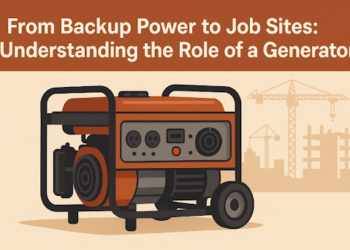Renewable energy continues to become more popular as the years pass. Among the renewable energy sources, solar power is emerging as one of the most promising and efficient options.
One technology that has gained attention in recent years is the solar power tower. But what exactly is a solar power tower, and how does it work?
In this article, we will explore the inner workings of a solar power tower, including its components, operation, and advantages. Keep reading to learn more!
What Are Solar Power Towers?
A solar power tower is also known as a central receiver system. It is a type of concentrated solar power (CSP) technology that uses a large array of mirrors, or heliostats, to focus sunlight onto a receiver at the top of a tower.
The concentrated sunlight heats a fluid, usually molten salt or water, which then produces steam to drive a turbine and generate electricity. Solar power towers are a promising technology for large-scale solar energy generation, with several operational plants around the world and more under development.
Different Parts of a Solar Power Tower
A solar power tower consists of several key components. Here are some of them.
Mirrors or Reflectors (Heliostats)
Heliostats are a key component of a solar power tower. They are large mirrors that are positioned on the ground and track the sun’s movement throughout the day, reflecting sunlight onto a receiver at the top of the tower.
A computer system controls the heliostats to optimize their positioning and ensure the most efficient collection of solar energy. A solar power tower will have hundreds or even thousands of heliostats arranged in a circular or semi-circular field around the tower.
Receiver
A solar power tower receiver is a device that captures the concentrated solar energy from the heliostats and converts it into thermal energy. You can find receivers at the top of the tower. It consists of a series of tubes or panels filled with a heat transfer fluid, such as molten salt.
The concentrated solar energy heats the fluid in the receiver to high temperatures. Reaching over 500 degrees Celsius. The heat transfer fluid is then used to generate steam, which drives a turbine to generate electricity.
Thermal Energy Storage
Solar power tower systems can only generate electricity when the sun is shining. This is why you need thermal energy storage to store excess heat generated during peak solar hours for use later.
This allows the system to continue generating electricity even after the sun has set or during cloudy weather.
How Does a Solar Tower Work?
First, the thousands of heliostats will reflect the sun’s rays toward the central receiver. Each of these heliostats is computer-controlled to track the sun throughout the day, ensuring maximum reflection.
Next, the central receiver on top of the tower absorbs the concentrated sunlight reflected by the heliostats. Inside the receiver is a heat transfer fluid, which is either molten salt or steam. The fluid absorbs the solar energy and heats up to a very high temperature.
Finally, the heat energy collected by the heat transfer fluid in the receiver is used to create steam, which is then used to drive a turbine. The turbine, in turn, drives an electric generator to produce electricity. An electrical grid will then receive the generated electricity to provide a clean and renewable source of energy.
Advantages of a Solar Tower
Solar power towers have several advantages. They are efficient, reliable, and of course, good for the environment. Here are the other advantages that solar towers have.
Scalable
You can design and build solar power towers in different sizes, depending on the energy needs of a particular region or industry. This means that you can install them in remote areas where there is no access to the electricity grid, as well as in urban areas, to support the existing power infrastructure.
Low Operating Costs
After building and installing a solar tower, it does not require any fuel to operate. This means that the cost of the solar energy produced is free, and there are no ongoing fuel costs or supply chain expenses associated with operating the tower.
Creates Jobs
Solar power towers can create jobs in several ways. First, there are jobs involved in the construction of the tower and its components, such as the heliostats and receiver.
Once the tower is operational, there are also ongoing jobs involved in its maintenance and operation. This will include technicians, operators, and maintenance personnel.
Solar power towers will also attract businesses and create jobs in related industries. This is because of the benefits that renewable energy gives to businesses.
So, if you are ready to reap the benefits of solar energy, check out these solar panels on this link!
Disadvantages of a Solar Tower
While solar power towers have many advantages, there are also some disadvantages.
High Startup Costs
Building a solar power tower requires a large amount of land and specialized components such as the heliostats, the tower, and the receiver. You need to design and build these components to withstand extreme weather conditions and to operate for many years.
Land Requirements
Solar power towers have a big land requirement because they need a large field of heliostats to direct sunlight onto the receiver at the top of the tower. This means that the area needs to be flat and free of obstructions, such as trees or buildings that could cast shadows on the heliostats.
Intermittent Power Production
Solar power towers have intermittent power production because they are reliant on the sun’s energy. This means that they can only generate electricity during daylight hours. Other weather conditions, such as cloud covers, can also affect their output.
Consider Solar Towers Now
The solar power tower is a simple and efficient way to generate green energy using the sun’s rays. As technology advances, solar power towers are becoming even more efficient.
They provide a cost-effective way to reduce our reliance on oil and gas. If you’re interested in learning more about solar power towers, consider checking out online resources and even speaking with local solar installers.
Did you find this article informative? Keep reading our blog for more!







